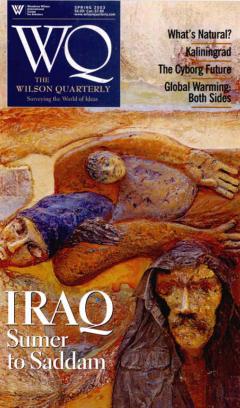Iraq From Sumer to Saddam


Debating political bias on the airwaves.
What comes after the White House?
The Electoral College may seem like a relic from the past, but there are good reasons to retain the system.
America's war with Iraq has altered its position in the world, bringing new responsibilities...and new dangers.
A new study yields fresh perspectives on the world's wealth.
Should Emma Goldman's passionate love affair lower her standing in the eyes of feminists?
Unilateral divorce was supposed to give abused wives a way out of marriage, but it spurred them to commit homicide instead.
Investigative journalism now seems at the mercy of lawyers everywhere.
When a great philosopher dies, we expect a great exit line. But Socrates' parting shot may carry more meaning than some have thought.
The International Monetary Fund is often criticized, but one economist rises to its defense.
Indoor air pollution, mostly from cooking fires, is a critical health problem among the world's poorer nations.
Even after the 9/11 attacks, it's still statistically safer to fly than drive.
The Civil War may have forged the American nation, but it also spawned a lot of really bad paintings. A critic explains why.
Does great art have to be beautiful?
Edward Bellamy's utopian novel, Looking Backward, was a curious product of his times.
The economic success of Shanghai seems too good to be true...and perhaps it is.
"Lincoln on Judicial Despotism" by Robert P. George, in First Things (Feb. 2003), Institute on Religion and Public Life, 156 Fifth Ave., Ste. 400, New York, N.Y. 10010.
A Survey of Recent Articles
" ‘A Score of Bloody Okinawas and Iwo Jimas’: President Truman and Casualty Estimates for the Invasion of Japan" by D. M. Giangreco, in Pacific Historical Review (Feb. 2003), 487 Cramer Hall, Portland State Univ., Portland, Ore. 97207–0751.
"Pricing and the Psychology of Consumption" by John Gourville and Dilip Soman, in Harvard Business Review (Sept. 2002), 60 Harvard Way, Boston, Mass. 02163.
"IQ and Income Inequality in a Sample of Sibling Pairs from Advantaged Family Backgrounds" by Charles Murray, in The American Economic Review (May 2002), 2014 Broadway, Ste. 303, Nashville, Tenn. 37203.
"Imagine" by Liz Cox, in Columbia Journalism Review (Jan.–Feb. 2003), Journalism Bldg., Columbia Univ., New York, N.Y. 10027.
"Jefferson, Emerson, and Jesus" by Richard Wightman Fox, in Raritan (Fall 2002), Rutgers Univ., 31 Mine St., New Brunswick, N.J. 08903.
"America’s Other Drug Problem" by Arnold S. Relman and Marcia Angell, in The New Republic (Dec. 16, 2002), 1331 H St., N.W., Washington, D.C. 20005.
"Narrative Trauma and Civil War History Painting, or Why Are These Pictures So Terrible?" by Steven Conn, in History and Theory (Dec. 2002), Blackwell Publishing, 350 Main St., Malden, Mass. 02148.
"Qaddafi and Militant Islamism: Unprecedented Conflict" by Yehudit Ronen, in Middle Eastern Studies (Oct. 2002), 75 Lawn Rd., London NW3 2XB, England.
"Son Preference in a Rural Village in North Vietnam" by Danièle Bélanger, in Studies in Family Planning (Dec. 2002), Population Council, One Dag Hammarskjöld Plaza, New York, N.Y. 10017.
Four recent books on parenting,reviewed by Elisabeth Lasch-Quinn.
Lis Harris explores a fresh crop of travel writers.
BEING AMERICA:
Liberty, Commerce, and Violence in an American World.
By Jedediah Purdy. Knopf.
337 pp. $24
IN RUINS.
By Christopher Woodward.
Pantheon Books. 280 pp. $24
UNCERTAIN SCIENCE,
UNCERTAIN WORLD.
By Henry N. Pollack. Cambridge Univ. Press. 252 pp. $25
COLLISION COURSE: The Strange Convergence of Affirmative Action and Immigration Policy in America. By Hugh Davis Graham. Oxford Univ. Press. 246 pp. $30
BOYD:
The Fighter Pilot Who
Changed the Art of War.
By Robert Coram. Little, Brown.
485 pp. $27.95
CAPTIVES: The Story of Britain’s Pursuit of Empire and How Its Soldiers and Civilians Were Held Captive by the Dream of Global Supremacy, 1600–1850. By Linda Colley. Pantheon. 438 pp. $27.50
DUTY, HONOR, COUNTRY:
The Life and Legacy of Prescott Bush.
By Mickey Herskowitz. Rutledge Hill Press. 229 pp. $24.99
PAKISTAN: Eye of the Storm. By Owen Bennett Jones. Yale Univ. Press. 328 pp. $29.95
IRVING HOWE: A Life of Passionate Dissent. By Gerald Sorin. New York Univ. Press. 386 pp. $32.95
COMING OF AGE AS A POET:
Milton, Keats, Eliot, Plath.
By Helen Vendler. Harvard Univ. Press. 174 pp. $22.95
DREAMING: An Introduction to the Science of Sleep. By J. Allan Hobson. Oxford Univ. Press. 170 pp. $22
A look at the city that was once the center of the Islamic world.
The British controlled Iraq for more than 40 years, but faltered when it came time to grant the country independence.
Saddam Hussein may be gone, but the pan-Arab and Baath legacies remain forces with which anyone contemplating the future of Iraq must reckon.
Two scientists present the evidence that greenhouse gases are causing the Earth's warming.
During the Cold War, the Soviet Union built the pan-Soviet workers’ paradise of Kaliningrad atop the physical ruins of the historic Prussian city of Königsberg. Now Kaliningrad--capitalist, impoverished, drug-ridden, and physically cut off from the rest of Russia--is struggling to build a new identity atop the political and economic ruin of its Soviet past.
What do tummy tucks and Viagra have to do with the brave new world of genetic technology and wonder drugs? In today’s debates over relatively commonplace medical matters, we can see the outlines of tomorrow’s titanic clashes over technologies that promise to alter human destiny.
In an age of pacemakers and microchip implants, the old nightmare vision of man melding into machine no longer seems completely far-fetched. Not to worry, says a noted observer of technology. Surprising things happen when the body interacts with technology.